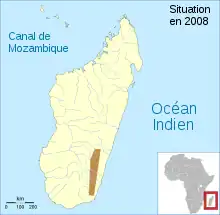Spinomantis elegans
Spinomantis elegans is a species of frog in the Mantellid subfamily Mantellinae, endemic to Madagascar.
| Spinomantis elegans | |
|---|---|
| Scientific classification | |
| Domain: | Eukaryota |
| Kingdom: | Animalia |
| Phylum: | Chordata |
| Class: | Amphibia |
| Order: | Anura |
| Family: | Mantellidae |
| Genus: | Spinomantis |
| Species: | S. elegans |
| Binomial name | |
| Spinomantis elegans (Guibé, 1974) | |
 | |
| Synonyms | |
| |
Taxonomy
This species was described in the genus Rhacophorus by Guibé in 1974.[2] He later transferred it to Mantidactylus.[3] Dubois put it in the subgenus Guibemantis,[4] but it was later moved to Spinomantis.[5]
Distribution and habitat
S. elegans occurs only in south-eastern Madagascar, with uncertain records form northern Madagascar. It has been recorded at elevations of 1,350-2,500 m, where it inhabits are subtropical or tropical moist montane forest and grasslands, always associated with rocky areas. It breeds in streams.[1]
Conservation
The species appears to be rare, and no males have ever been collected. It is currently classified as Near Threatened by the IUCN. Its forest habitat is constantly shrinking due to anthropogenic influences. S. elegans is present in several protected areas.[1]
References
- IUCN SSC Amphibian Specialist Group (2016). "Spinomantis elegans". IUCN Red List of Threatened Species. 2016: e.T57479A84171302. doi:10.2305/IUCN.UK.2016-1.RLTS.T57479A84171302.en. Retrieved 15 November 2021.
- Guibé, J. (1974). "Batraciens nouveaux de Madagascar". Bulletin du Museum National d'Histoire Naturelle. Paris. Serie 3, Zoologie. 145: 1009–1017.
- Guibé, J. (1978). "Les batraciens de Madagascar". Bonner Zoologische Monographien. 11: 1–140.
- Dubois, A. (1992). "Notes sur la classification des Ranidae (Amphibiens anoures)". Bulletin Mensuel de la Société Linnéenne de Lyon. 61 (10): 305–352. doi:10.3406/linly.1992.11011.
- Glaw, Frank; Vences, Miguel (2006). "Phylogeny and genus-level classification of mantellid frogs (Amphibia, Anura)". Organisms, Diversity & Evolution. 6 (2006): 236–253. doi:10.1016/j.ode.2005.12.001.
